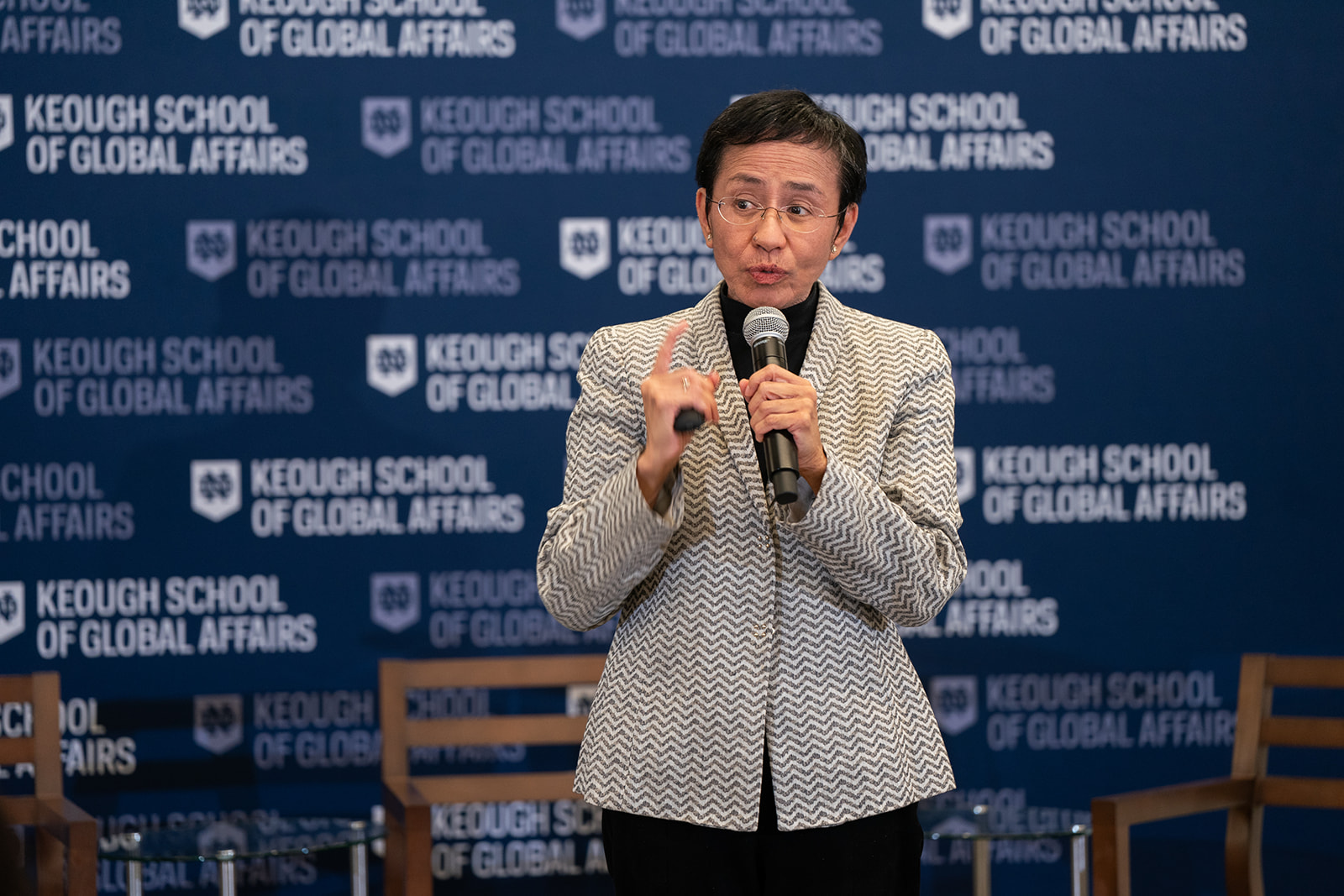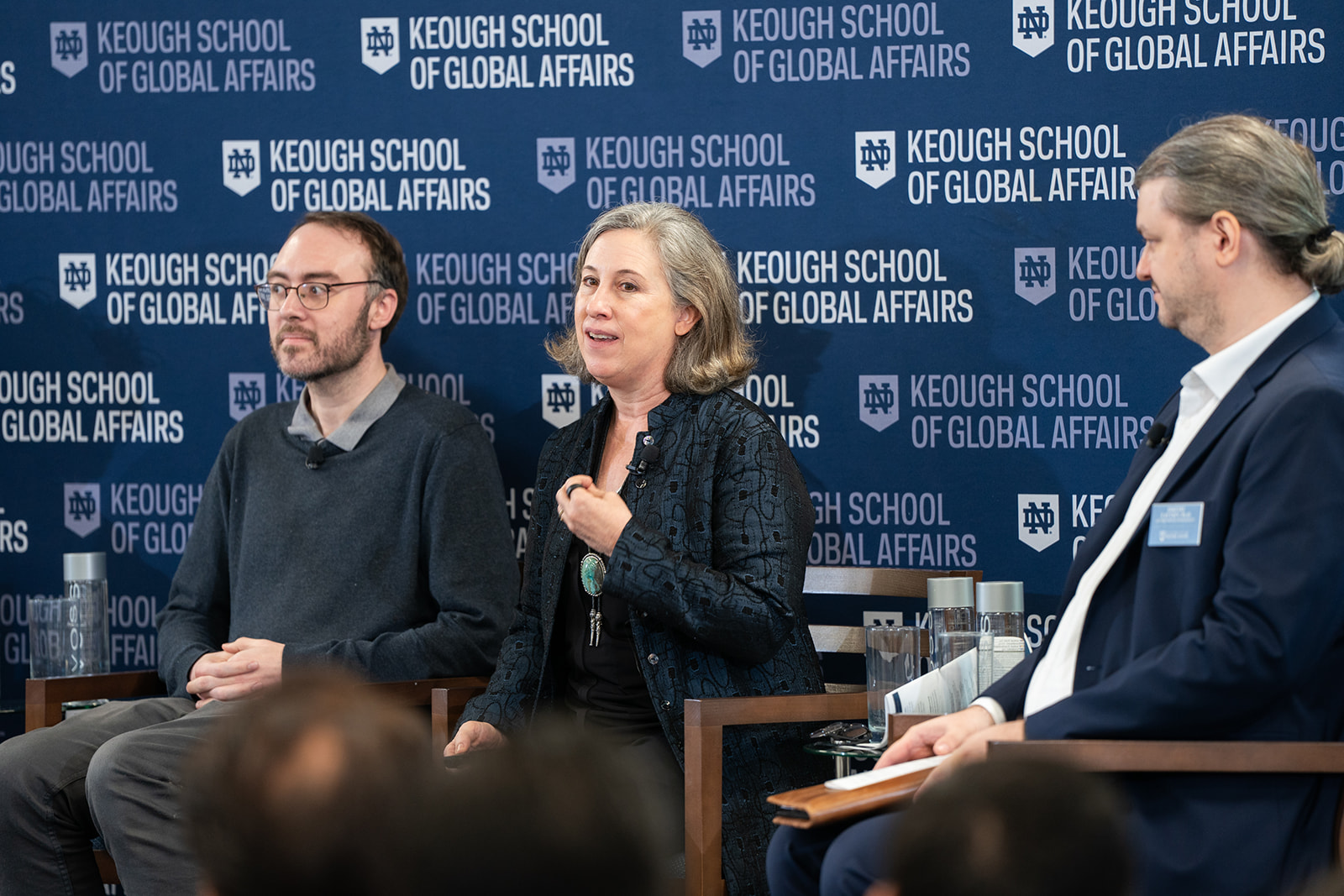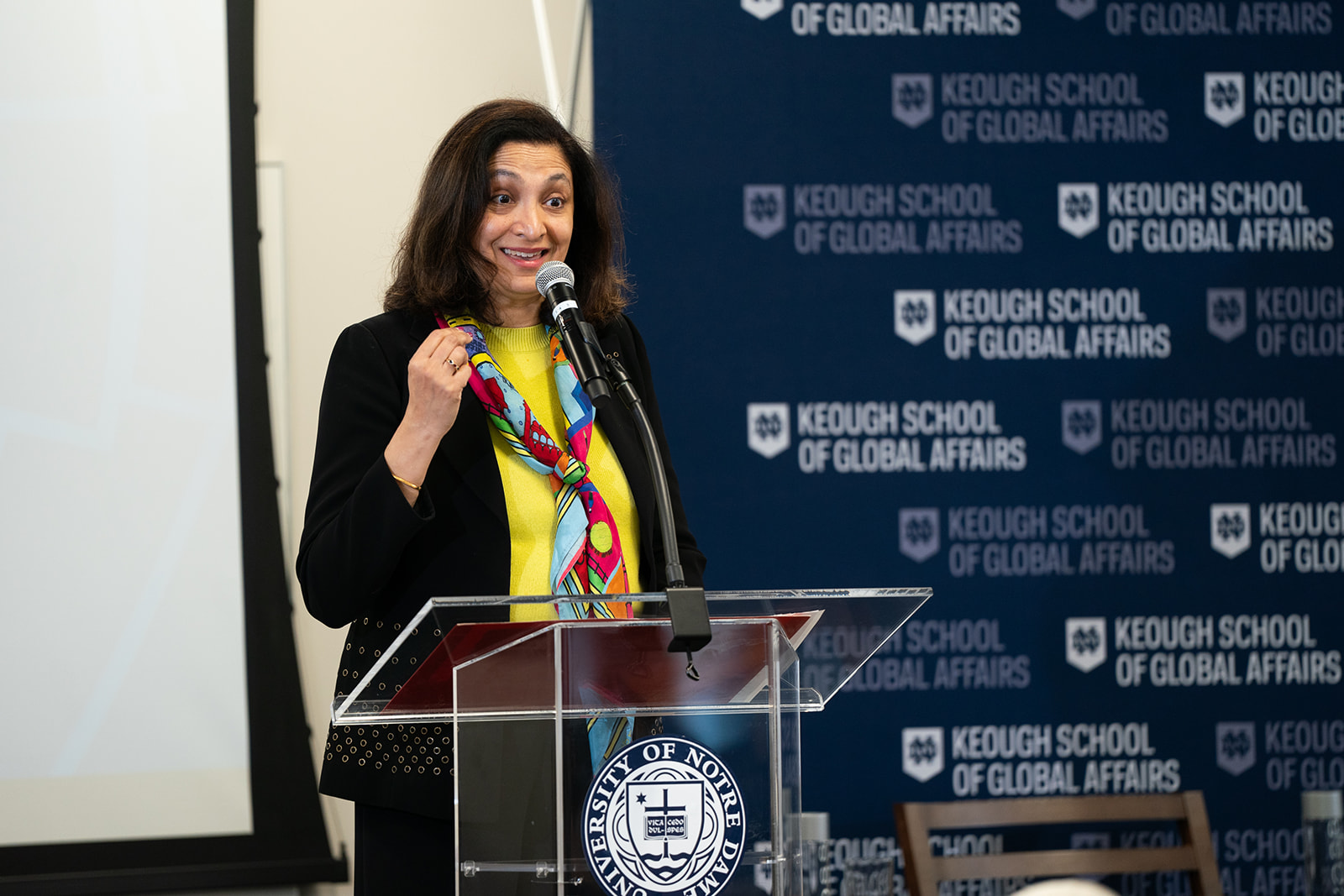Nobel laureate Maria Ressa, a Filipino-American journalist known for defending democracy and fighting disinformation, called for regulating Big Tech and touted journalism as an antidote to tyranny in a speech at the Keough School of Global Affairs’ March 14 digital democracy symposium.
Ressa, a Keough School distinguished policy fellow, delivered the keynote address at the symposium, which was held at the Keough School Washington Office. The event explored deliberative technologies—a new class of digital tools that aim to support constructive public discussion of policy issues.
While individual panels focused on the promise of these technologies, Ressa’s remarks underscored the peril of unregulated tech, which she said creates fast-spreading disinformation, empowers bad actors and ultimately threatens democracy. She painted a picture of fast-moving technological disruptions that amplify existing inequalities and create opportunities for aspiring autocrats, providing them with supercharged tools to mislead the public and chip away at democracy and human rights.

Ressa witnessed this reality firsthand in the Philippines, where she co-founded the news site Rappler in 2012 with three other women. The company earned recognition for fighting fake news and spotlighting human rights abuses by the regime of former Philippines president Rodrigo Duterte. In 2021, Ressa was honored with the Nobel Peace Prize.
“Today, it is a person-to-person defense of democracy,” Ressa said. “Death by a thousand cuts, this is how our world shifts. It was also how in the Philippines we lost our rights. For us, it was ‘Oh, it’s not that bad’—slash, slash slash—and you’re just bleeding. And you don’t realize how weak you’ve become until you die.”
The key, Ressa said, is fighting back. She repeated her calls to reform or repeal Section 230 of the Communications Decency Act, a United States law that protects online platforms from liability for most things that users say or do on them. The law, passed almost three decades ago, was intended to protect smaller companies from frivolous litigation but has come under bipartisan scrutiny in recent years amid an increase in online disinformation.
Ressa also critiqued the micro-targeting model of advertising that social media uses to serve up algorithmically influenced content and advertising. “We need to stop surveillance for profit because everything is built on our data and we’ve never given permission for it,” she said. “Large language models and generative AI build on surveillance capitalism. And it’s gotten worse.”
In addition, Ressa called out bias in Big Tech. “We also need to stop encoded bias,” she said. “If you are a woman, LGBTQ+, if you are brown, it’s going to work against you. If you’re marginalized in the real world, you’re further marginalized in the virtual world. I did an interview with Urvashi Aneja who runs the Digital Futures Lab in Goa, India, and she said that colonialism moved online and that people in the Global South are colonized twice because the code coming to us is largely from Silicon Valley.”

Ressa’s remarks capped off a daylong symposium that also explored the upsides of technology—in particular, newer deliberative technologies that governments and researchers are experimenting with in an effort to boost democracy. The idea is that they can support public discussion on policy issues, encourage citizens to participate and synthesize a wide range of insights, helping large numbers of people listen at scale to each other and find common ground amid polarization.
Individual sessions provided an overview of deliberative technologies, explored opportunities and challenges for digital democracy, and discussed an agenda for the future. The symposium was presented by the Keough School and its Kellogg Institute for International Studies, with participation from the Council on Technology and Social Cohesion, the International Republican Institute, the National Democratic Institute and the National Endowment for Democracy, and made possible thanks to support from the Pulte Platform for Policy.
Presenters included faculty experts from Notre Dame’s Keough School, Lucy Family Institute for Data & Society, and Tech Ethics Center; from the International Republican Institute, the National Democratic Institute and the National Endowment for Democracy, and the Department of State; from the UN and Google; and from organizations such as Pol.is and Remesh, which have deployed deliberative technologies. Lisa Schirch, Richard G. Starmann, Sr. Professor of the Practice of Peace Studies at the Keough School’s Kroc Institute for International Peace Studies, helped organize the event, which built upon her research.

In her opening remarks for the symposium, Uzra Zeya, Under Secretary of State for Civilian Security, Democracy, and Human Rights for the U.S. Department of State outlined the stakes for protecting democracy in 2024, when approximately 60 countries will hold elections.
“In our interconnected world, impunity online has profound ripple effects,” she said. “States are watching and learning from one another. Adapting. Building on techniques to repress human rights and hamper democratic governance. They shut down the internet, target election infrastructure with malicious cyber activities, and sponsor AI-facilitated disinformation campaigns and synthetic content aimed at shifting election results and suppressing the political participation of marginalized groups. In this super-year of elections, when a record-breaking 40% of the world’s population will vote, the impacts of mis- and dis-information could be catastrophic.”
Given the high stakes, Ressa’s message serves as a timely call to action to prevent the erosion of democracy, symposium organizer Lisa Schirch said.
“Maria Ressa has devoted her life to the well-being and human dignity,” Schirch said. “In the midst of fame and attention, she continues to provide a guiding light, helping us see how we can protect democracy in these days of chaos and concern for the future of humanity.”
Learn how deliberative technologies offer policymakers, think tanks, tech companies, and civil society new paths to stem the tide of democratic backsliding.


